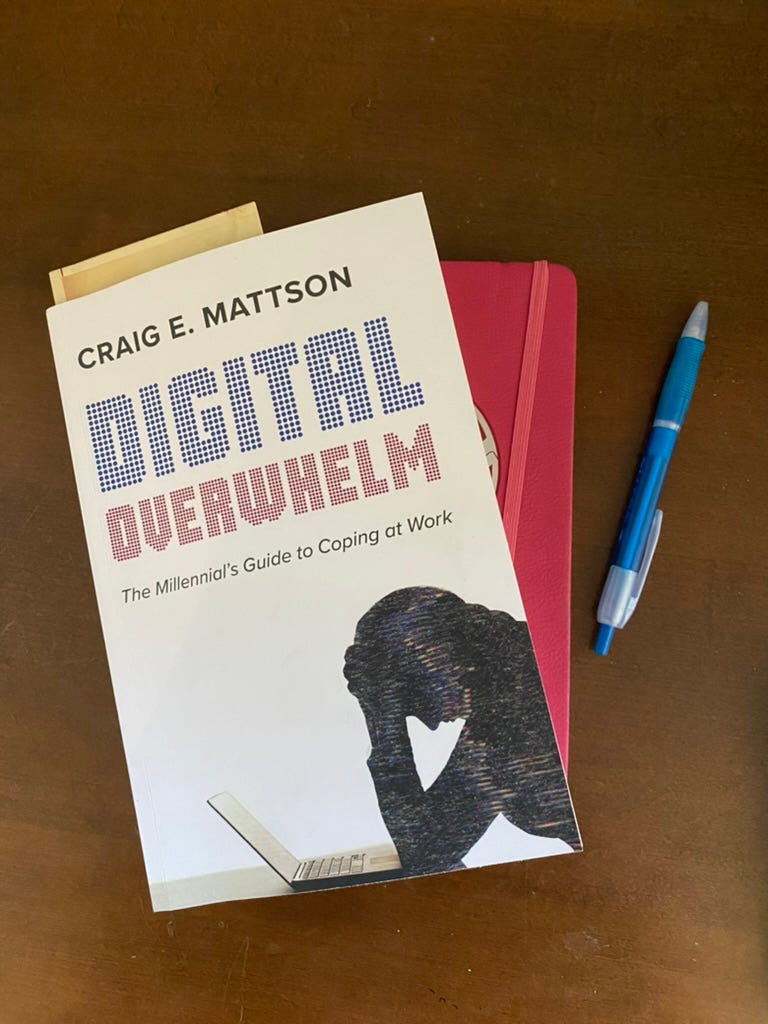Are You Working Too Damn Much?
Try 3 conversations to address the crises of over-functioning and over-employment
Welcome to a weekly work-culture newsletter—every other Tuesday’s a podcast—that helps you make shifts in word and deed so you and your team can thrive.
If your job these days seems to be requiring the skills of four working professionals and two smart robots, read what follows to find scripts for transforming total work.
I should say first that this week’s problem is tough for me, because, yeah, hi everybody, I’m Craig, and I’m a workaholic.
Blame it on my Protestant upbringing and my latch-key generation. Blame it on the scrappy, cash-poor organizations that hired and then quickly over-employed me. Blame it on the hole in my heart I keep trying to fill with projects.
But there are just way too many days when work’s the meth that’s cooking me.
Last night, though, I had a tiny revelation. I sat on my front porch with a friend, and we talked about life and work while the sun sank. It was a hot evening, so warm that we had to keep sliding our chairs across the porch to find some shade. But as we chatted, I got a sense of the things that keep a hard-working person’s soul intact.
I’m still processing that exchange. But here’s what I’m thinking this morning: the only path through a life of total work is a trio of conversations with your brain, your bestie, and your boss.
Sherry Turkle, glossing Henry David Thoreau, talks about the three conversational chairs we need in our lives. Maybe these Adirondacks in my own backyard will serve as a framing metaphor for the organizational exchanges you and your working community need to stay sane in conditions of overwork.
Conversation #1: Talk to your brain
If your mind’s like mine, it’s a coked-up extrovert at a frat party. Sometimes this mad chattiness is great, especially when you need 463 new ideas. But most days, my brain, and probably yours, is talking so much it’s hard to listen to that quieter and more elusive creature we call the soul.
You can’t just tell your brain to shut up. But you can be smart about how you intervene on its mindless chatter. Here some suggestions for that convo:
Ask old questions, find new intel. Your skull’s a dark place, so your brain can’t always see what’s going on at work. Give it some fresh data by doing what relational frame theorists call tracking, a practice that maps out cause and effect. Here’s a script:
Question: What happened when you answered those emails within 10 seconds of receiving them?
Answer: I got 10 more emails from her in the next 10 minutes.
Question: So, how’s that Inbox Zero working out for ya?
Take your brain on a field trip out of your head. I’m a compulsive writer. I use journaling to deal with the insane talkativeness of my brain. But longhand brain chats may not be for you. Try these communication interventions instead:
Audio journaling: click open a note-taking app like Voice Memo and make a podcast called Tales My Lizard Brain Is Telling Me. Your pre-frontal cortex will like and subscribe.
Habit tracking: I keep a Google Sheet for certain parts of my life where my brain is especially effed up. I fill it out on Saturday afternoons, and those columns—I’m telling you—they bring some serious clarity.
Coloring: No, seriously. Check out an intergenerational discussion of this practice on the Mode/Switch Pod.
Of course, if all you ever do is talk to your brain, the benefits will mostly accrue to you. And because this is a work-culture newsletter, I’d be remiss if I didn’t address coworker communication.
From the beginning, from infancy, we’re relational beings. We know ourselves through the reflection, the mirroring of the parent. We are constantly in relationship to our world. We’re not separate from the world — we are of the world, and we are of each other. So we need each other to make sense out of our experience.
- Mark Epstein
Conversation #2: Talk to your bestie
This convo might strike you as an obvious starting point. But as good as it feels to talk to your coworker about how insane your work’s become, that convo can go south in a hurry. Keep a couple of things in mind:
Gossip-up not down. Not saying you shouldn’t ever gossip. In fact, the Mode/Switch Pod recommends some workplace gossip. But gossiping-down is just gripes and trash talk. It’s an intravenous feed of false superiority.
Gossiping-up is generative and imaginative. What if we all agreed to have one day a week with no meetings? What if we changed how we’re handling one-on-ones?
Practice critical conversational loyalty. Your coworkers need you to be both empathetic and critical. Part of the reason they’re over-employed is they’re too attached to what’s exhausting them. This will take some bridging:
I hear what you’re saying, and—geez, thanks. You make it easy for me to be honest with you. But I might talk about your workload differently. Can I try to tell your story back to you?
Honestly, it’s just occurring to me that it might not be best to have this conversation with a coworker. I have a monthly meeting with four friends that involves some beverages, shall we say, not allowed at work. Those after-hours conversations do some quietly transformative work.
Conversation #3: Talk to your boss
Preparing for this newsletter, I reached out to a Mode/Switch reader who identified as severely over-worked. My question: how do you explain your insane work load?
Her theory is that she was hired to launch a new project, but the launchers of the project “didn’t know what they didn’t know.” So, they didn’t build and keep a team around her. “Turns out creating something from nothing is just way more than a full-time job.”
If you can relate to this story, you might need a conversation with your boss. It’s going to take some gumption and some shrewdness.
Be your manager’s therapist for a second. Your boss might be operating by some dysfunctional rules for work. Ask questions to create distance from those tacit rules:
I’ve noticed some unspoken “rules” around here. If I had to name them, they’d be things like, “Never let the ball drop” or “Don’t worry about clocking out—just get everything done” or “We need this perfect before the C-suite sees it.”
Can we talk about what keeps happening as we keep complying with these guidelines?
Asking questions like that can expand your boss’s attention for actual consequences—and thus make it possible to change the unspoken rules and maybe create some margin.
Make some space for your one-up to dream.
I know, I know--this sounds rather Andrew Lloyd Webber of me. But try this script with your boss:
Imagine we’re still working here in ten years, what kind of results would make you feel, like, yeah, we did good work?
Here’s what that question can do: it can help your boss detach from an anxious list of outputs and focus instead on a sensible list of outcomes. Alternatively, you could ask:
Say we had all the energy in the world—what result would you most want us to reach for?
This script encourages reflection that’s life-giving because it’s purpose-driven.
You know, if you’ve been following the Mode/Switch for a while, that the work of organizational persuasion is very, very hard work. (Check out my discussion of this issue.) But take heart: although this conversation takes some patience, it has potential for longterm impact.
Two last things…
I just drank the last of this morning’s coffee, so it’s time to press send. But I’m hesitating for a second. Maybe there’s a caveat and a hope I can add.
Not gonna lie: organizational conversation is just the hottest mess. The one thing all of 3 of these conversations have in common is a low-success rate. Especially if, by success, you mean a quick and surefire elimination of everything that’s excessive in your workplace. (I learn that caveat all the time from writers like Oliver Burkeman and Mark Epstein.)
But here’s a hope, too. I keep thinking about that front-porch chat with my friend last night, as we kept shimmying our chairs sideways to find some shade. I’m in danger of inflating the import of a single conversation, I know. So, you know, you might need walk back my mysticism in the comments below. But the best way I know how to explain the strength I took from that talk is that it made a precious kind of witness possible and palpable.
-craig





